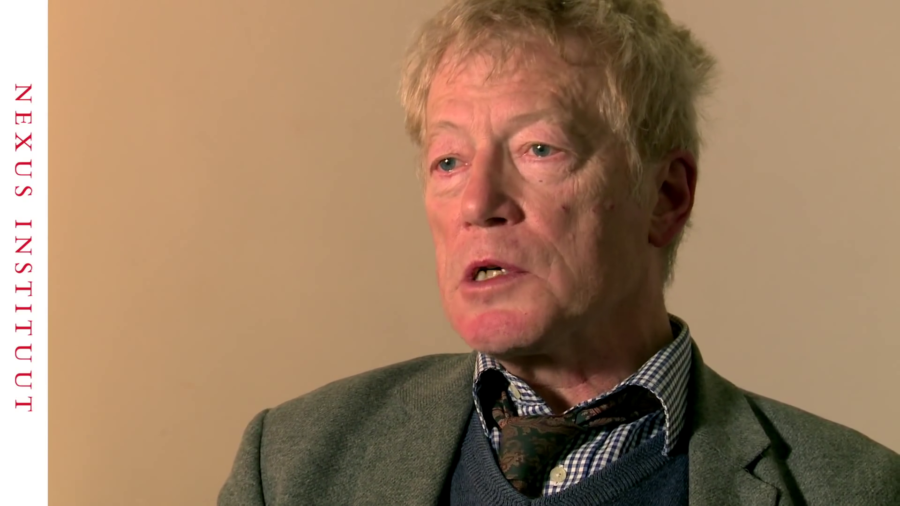Fiona Schouten: First of all, just now in the debate there seemed to be a sort of partition, you being sort of the realist against the idealism of Alain Badiou.
Roger Scruton: Yes.
Schouten: Don’t you think the world needs a bit of idealism?
Scruton: No, I think it needs a bit less idealism. The 20th century was created by idealism. Communism and fascism and Nazism are all based on idealized systems, what the world should be ideally, and how it isn’t what it should be, and therefore we’re entitled to change it radically and take control of it in order to do so. And the immediate result is genocides, as we see. I think idealism of Badiou’s kind is extremely dangerous. I was there in 1968 in Paris at the time when he was in the streets shouting out his ideals, and it was enough to convert me to the other side.
Schouten: Really.
Scruton: Yeah.
Schouten: It was that bad?
Scruton: It was that bad seeing these arrogant young people pretending that they represented the workers, whereas in fact they were wealthy byproducts of the middle class, wanting to dictate to everybody the system of politics which they had conceived from their half-educated reading. And it stayed in that class of French intellectuals ever since. And I think people like me have a duty to be realist in opposition and say, “Look, this unity between the intellectuals and the workers, who was actually creating it? It was you intellectuals. How many workers were involved? Very few. Only those that you could control through trade unions.” And let’s get rid of all those illusions and treat people as they are.
Schouten: Alright. I won’t use the word “crisis,” but surely you must think that there are things in the world today that are wrong and that should be changed.
Scruton: Yes. Of course. There are lots of things that are wrong and should be changed. But the question is how. The revolutionary way of addressing this question is to form together a small conspiracy of the elite to craft a solution and then impose it from above on the mass of mankind. I take the other view, which is the classical English view. Which is that people should be given the freedom to understand their problems and address them from their own existing repertoire of social and political gestures, and gradually come to some consensus. And that is a very different approach.
Schouten: So it is. Absolutely. You’re not saying, though, that we need a new aristocracy?
Scruton: No. Things of course would be better if I had more of a voice than I do. But there’s no way in which that can happen. But I’m lucky that the Nexus Institute allows me to speak. But in my book on green philosophy I do describe what I think of as an alternative to these top-down solutions to the big problems of the environment, and how my alternative is to make the space for ordinary motives of ordinary people to take charge of the problem.
Schouten: Alright. And how would they then take charge of the problem?
Scruton: Well, the problem first of all has to be local. This is one thing I agree with about what Badiou said in his lecture, which is that the great points of transition in communities and also in individuals are local. That they involve some problem that you are living through and which also makes you recognize your dependence upon other people, how you need them to join with you in order to solve this problem.
And the Dutch did this very well in the 17th century. They had a huge environmental problem, after all, and they built the dikes to solve it. It is one of the great achievements. It was not done by some committee of revolutionary vanguard imposing upon the ordinary Dutch people a solution they didn’t want. It was ordinary people locally getting together to build their own dike. And gradually the country solved its problem. And I think many of our environmental problems today can be confronted in that way, as long as you keep those intellectuals out of them.
Schouten: Finally, you mentioned that you think the sacred should return to our society. Explain that [inaudible].
Scruton: Yes. I think human beings are incomplete without a concept of the sacred. They must have a sense that this world in which they live has moments, places, events, people, etc. which are in some sense standing outside the ordinary course of events. They’re not just things to be bargained with, things to be bought and sold, but as it were stand in judgement on us. And all of us have that sense when we’re children, because that is instinctive in us. But it’s wiped away by materialism and by the ease of satisfying our wants and so on. And the result is that we are in a certain measure bereft. Bereft of something that is needed for our happiness, which is the sense that we are in good relations with sacred things.
Further Reference
How to Change the World?, the 2012 Nexus Conference event page
